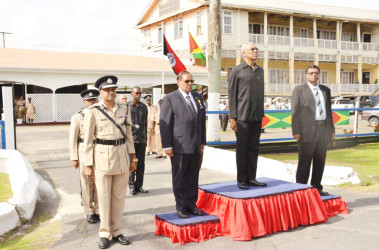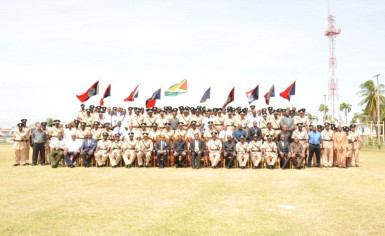Community Policing Groups (CPGs) are pivotal to the ongoing war on crime and violence but should not be seen as a parallel police force, President David Granger said yesterday.
Speaking at the opening of this year’s Police Officers’ Annual Conference, Granger spoke at length about the importance of community policing and said that despite the criticisms it has faced it is a necessary bridge between the police and the community.
“Community policing establishes partnerships and these partnerships emphasise problem solving and they place emphasis on public safety and public service, with the aim of improving the quality of life,” he said.

Granger also used the occasion to commend the force on its recent successes but said there are still too many unsolved matters.
The conference, which is being held under the theme “Consolidating on partnership programmes, enhanced public trust and capacity building to provide effective security,” ends tomorrow. It is being held at the Police Officers’ Mess Annex, Eve Leary, and will see the attendance of the force’s most senior ranks, including divisional commanders.
Granger told the opening, which saw the attendance of government officials and senior members of the judiciary that the force must work alongside the CPGs to bring the crime rate down.
In this regard, he said the force must look to develop a strategy for improving human safety in all communities without necessarily building more police stations. “This is a strategy which would result in that evolution of our existing concept of community policing. But community policing is not a substitute, it is a supplement to regular policing,” he stressed.
“It must support professional law enforcement. Support not supplant professional law enforcement,” he said to applause.
He also emphasised that community policing does not mean putting an “army of vigilantes” into communities but rather it speaks to building a partnership between the police force and the residents.
Granger stated that civil society also has a role to play in keeping communities safe by working with the police force as partners. He said that there is need for more patrols–in all its forms—as a means of deterring and detecting crimes.
Battered

Granger, a retired Brigadier and former national security adviser, said that the concept of community policing since its formation has been “battered.”
“Sometimes, Community Policing Groups collapse. Some remain inactive for long period of time. Despite the establishment of our Community Policing Secretariat and the establishment of community policing executives, these groups rise and fall,” he observed.
He noted that over the past 15 years the previous administration developed a “multi-dimensional” approach and tried to create several “parallel schemes.” However, he said that in examining what needs to be done about crime and making communities safe, CPGs, neighbourhood policing programmes and crime stoppers schemes need to be experiment with.
“It is my view that community policing is a common good but unfortunately that concept has been subject to bizarre interpretations over the years,” he said
Granger stated that community policing is not a group but rather a process that promotes problem solving techniques and improves public safety by forging bonds of trust between the police and the public.
He stressed that community policing has an important role to play and he urged that efforts be made to ensure that it does not become a victim of “political policing,” in which some villages have efficient community policing and others do not have because of the favouritism or the hospitality of the administration of the time. He added that it must not be perceived as protecting special interests and ignoring the common good.
During his address, Granger also congratulated the Commissioner and the Force for their “ability to solve crime more quickly than before” but noted that there are too many cold cases.
Granger said he has already told the commissioner that government will give the CID everything it requires to ensure investigations are not interrupted and delayed. “The entire country looks to the force to ensure human safety and today I would like to commend you and ask you to consider and reconsider this concept of community policing. Do not take it for granted. Guyana needs you and our citizens need an efficient police force,” he said.
According to Granger, safe communities are the “core” of a country and the government’s approach is to encourage citizens to take pride in their homes, communities, villages, neighbourhoods, regions and country. “Our approach is about respecting and protecting the most vulnerable members of society–the elderly, the women and children, especially girl children,” he said.
Granger told the gathering that it is in this regard that government is disturbed that so many brutal crimes are being committed on the elderly and women. He made mention of a few cases, including the rape/murder of an elderly woman, the Hope woman who was burnt to death earlier this year when bandits set fire to her home and “hire purchase” murders at Berbice and at Herstelling.
“The safety of citizens in their homes and in their communities is the greatest and foremost concern… citizens must be able to live in communities without the fear of being robbed or being abused,” he said. “We cannot achieve the good life in the absence of human safety,” he added.
Address causes of crime
The president noted that the sanctity and privacy of homes must be protected from criminals and that if the police is to win the fight against crime and violence it cannot ignore the causes of crime. He said, in particular, that the causes of the crimes which occurred from 2000 to 2010 must be examined.
Accordingly, Granger said that the force has to uphold that unwritten social contract between citizens and the state. He said that the state, through the police force, is obligated to uphold its side of the social contract.
“Our government is committed to ensuring that citizens remain safe,” he said before adding that Guyana’s rate of serious crime is a result of over two decades of “deliberate disregard for the essential need of human safety.”
He spoke of the rejection of the United Kingdom financed Security Sector Action Plan, the neglect of the National Drug Strategy Master Plan, the shelving of the reports of the Disciplined Force Commission and a dozen other consultancies and studies mainly from UK under former PPP/C governments.
He assured that his government would implement the longstanding plan for the reform of the security sector and will bring a new approach that will not only suppress crime but also addresses the causes of crime. This approach, he said, is meant to make Guyana safer for women, children and other vulnerable members of society.
The president said that the cost of human safety today is “high, too high.” He said that this cost could be calculated when one takes a trip around the city and the countryside and sees the steel grill barricades at restaurants and at the doors and windows of private residences.
He said that this price can also be calculated by the proliferation of private security firms and by the large numbers of persons who are applying for firearm licences. According to Granger, the price is also measured in the employment of armed sentries at gold and diamond mining firms.
“Communities must be secured against crime and violence. We, therefore, need to adopt a more collaborative culture if we are to make human safety a reality. We must therefore be prepared to have a second look at the current highly centralised system of policing,” he said, while noting that it was developed when there was a highly centralised sugar industry and was focused then on the suppression of riots on the plantations.
According to Granger, a system based on human safety in communities must be developed rather than one for the safety of the sugar industry. He said that the sparsely populated rural and hinterland communities make highly centralised policing impossible, since it is impossible to establish a police station in every village. He added that there is need for a system from which residents in such villages and communities can be assured of security even in the absence of a police station.





